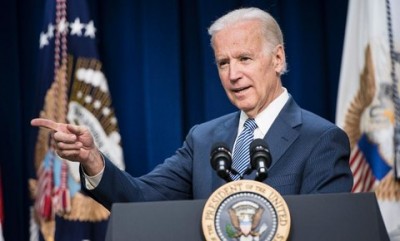Joe Biden in 2020 Copies Hillary Clinton in 2016

The 2016 Iowa Democratic Presidential Caucuses were held on 1 February 2016 and produced 49.84% for Hillary Clinton and 49.59% for Bernie Sanders.
On 12 January 2016, Politico headlined “Sanders bests Clinton in new early state polls” and reported that “The intensifying rivalry between Hillary Clinton and Bernie Sanders spiked a few degrees on Tuesday with two new polls showing the Vermont senator catching fire in not only his regional stomping ground of New Hampshire but also in Iowa, where Clinton enjoyed a double-digit lead as late as mid-December.”
The 2020 Iowa Democratic Presidential Caucuses are to be held on 3 February 2020. On 26 January 2020, Political Wire headlined “Tight Race in Iowa” and reported that “A new CBS News poll in Iowa shows Bernie Sanders is leading the Democratic presidential race with 26%, followed by Joe Biden at 25%, Pete Buttigieg at 22%, Elizabeth Warren at 15% and Amy Klobuchar at 7%.”
That CBS News poll in Iowa showed also that whereas only 33% of the likely voters thought that Sanders would beat Trump if the nominee, 45% thought that Biden would beat Trump if the nominee. Biden also scored far higher than Sanders on “Prepared to be Commander in Chief”: 84% on that, compared to Sanders’s 68%. Also on other factors, the findings were remarkably similar for Biden as compared to what the polls at around this same time had been showing for Clinton. Also, the pre-primary polls in 2016 were showing almost identical demographics for Clinton’s voters as the 2020 pre-primary polls are showing now for Biden voters — such as an overwhelming majority of Blacks supporting Clinton then and Biden now, but also on almost all other demographic factors. And, likewise, Sanders’s voters in 2020 seem to be the same demographics as Sanders voters in 2016 were.
Clinton, of course, received the Democratic Party nomination and was widely expected to beat Trump but she lost to him (though she won California by 4,269,978 in the popular vote, and so beat Trump by 2,864,974 in the nationwide popular vote, while she lost all other states by 1,405,002 votes, and so she would have been California’s President if she had won, but the rest of the nation wouldn’t have been happy).
Among the top reasons why Democrats in primaries and caucuses voted for Clinton was that they thought she would have a higher likelihood of beating the Republican nominee than Sanders did. However, by the time when Election Day rolled around, the passion that Republicans felt for their nominee, Trump, was much stronger than was the passion that Democrats felt for their nominee, Clinton. During the Democratic primaries, polls were showing that the Democrats who were voting for Sanders to become their Party’s nominee were far more passionate in their support of him than was the case regarding the Democrats who were voting for Clinton to become the Democratic nominee. And nobody questions that Trump was the passion-candidate in the Republican Party’s primaries and caucuses.
On 1 May 2017, McClatchy newspapers headlined “Democrats say they now know exactly why Clinton lost” and reported that,
A select group of top Democratic Party strategists have used new data about last year’s presidential election to reach a startling conclusion about why Hillary Clinton lost. Now they just need to persuade the rest of the party they’re right.
Many Democrats have a shorthand explanation for Clinton’s defeat: Her base didn’t turn out, Donald Trump’s did and the difference was too much to overcome.
But new information shows that Clinton had a much bigger problem with voters who had supported President Barack Obama in 2012 but backed Trump four years later.
Those Obama-Trump voters, in fact, effectively accounted for more than two-thirds of the reason Clinton lost, according to Matt Canter, a senior vice president of the Democratic political firm Global Strategy Group. In his group’s analysis, about 70 percent of Clinton’s failure to reach Obama’s vote total in 2012 was because she lost these voters. …
Although Clinton has blamed her loss on Putin, and on Sanders — and perhaps if Biden wins the nomination he will likewise blame Putin and Sanders if he subsequently loses to Trump — the passion factor is actually much stronger an influence on whom the winner of an electoral contest will be than losing candidates wish to admit or publicly acknowledge; and it could turn out to be the case in 2020, just the same as it did in 2016.
*
Note to readers: please click the share buttons above or below. Forward this article to your email lists. Crosspost on your blog site, internet forums. etc.
Investigative historian Eric Zuesse is the author, most recently, of They’re Not Even Close: The Democratic vs. Republican Economic Records, 1910-2010, and of CHRIST’S VENTRILOQUISTS: The Event that Created Christianity.

